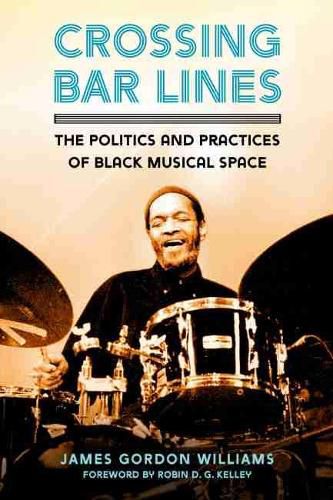Readings Newsletter
Become a Readings Member to make your shopping experience even easier.
Sign in or sign up for free!
You’re not far away from qualifying for FREE standard shipping within Australia
You’ve qualified for FREE standard shipping within Australia
The cart is loading…






This title is printed to order. This book may have been self-published. If so, we cannot guarantee the quality of the content. In the main most books will have gone through the editing process however some may not. We therefore suggest that you be aware of this before ordering this book. If in doubt check either the author or publisher’s details as we are unable to accept any returns unless they are faulty. Please contact us if you have any questions.
In Crossing Bar Lines: The Politics and Practices of Black Musical Space James Gordon Williams reframes the nature and purpose of jazz improvisation to illuminate the cultural work being done by five creative musicians between 2005 and 2019. The political thought of five African American improvisers-trumpeters Terence Blanchard and Ambrose Akinmusire, drummers Billy Higgins and Terri Lyne Carrington, and pianist Andrew Hill-is documented through insightful, multilayered case studies that make explicit how these musicians articulate their positionality in broader society.
Informed by Black feminist thought, these case studies unite around the theory of Black musical space that comes from the lived experiences of African Americans as they improvise through daily life. The central argument builds upon the idea of space-making and the geographic imagination in Black Geographies theory. Williams considers how these musicians interface with contemporary social movements like Black Lives Matter, build alternative institutional models that challenge gender imbalance in improvisation culture, and practice improvisation as joyful affirmation of Black value and mobility. Both Terence Blanchard and Ambrose Akinmusire innovate musical strategies to address systemic violence. Billy Higgins’s performance is discussed through the framework of breath to understand his politics of inclusive space. Terri Lyne Carrington confronts patriarchy in jazz culture through her Social Science music project. The work of Andrew Hill is examined through the context of his street theory, revealing his political stance on performance and pedagogy. All readers will be elevated by this innovative and timely book that speaks to issues that continue to shape the lives of African Americans today.
$9.00 standard shipping within Australia
FREE standard shipping within Australia for orders over $100.00
Express & International shipping calculated at checkout
This title is printed to order. This book may have been self-published. If so, we cannot guarantee the quality of the content. In the main most books will have gone through the editing process however some may not. We therefore suggest that you be aware of this before ordering this book. If in doubt check either the author or publisher’s details as we are unable to accept any returns unless they are faulty. Please contact us if you have any questions.
In Crossing Bar Lines: The Politics and Practices of Black Musical Space James Gordon Williams reframes the nature and purpose of jazz improvisation to illuminate the cultural work being done by five creative musicians between 2005 and 2019. The political thought of five African American improvisers-trumpeters Terence Blanchard and Ambrose Akinmusire, drummers Billy Higgins and Terri Lyne Carrington, and pianist Andrew Hill-is documented through insightful, multilayered case studies that make explicit how these musicians articulate their positionality in broader society.
Informed by Black feminist thought, these case studies unite around the theory of Black musical space that comes from the lived experiences of African Americans as they improvise through daily life. The central argument builds upon the idea of space-making and the geographic imagination in Black Geographies theory. Williams considers how these musicians interface with contemporary social movements like Black Lives Matter, build alternative institutional models that challenge gender imbalance in improvisation culture, and practice improvisation as joyful affirmation of Black value and mobility. Both Terence Blanchard and Ambrose Akinmusire innovate musical strategies to address systemic violence. Billy Higgins’s performance is discussed through the framework of breath to understand his politics of inclusive space. Terri Lyne Carrington confronts patriarchy in jazz culture through her Social Science music project. The work of Andrew Hill is examined through the context of his street theory, revealing his political stance on performance and pedagogy. All readers will be elevated by this innovative and timely book that speaks to issues that continue to shape the lives of African Americans today.